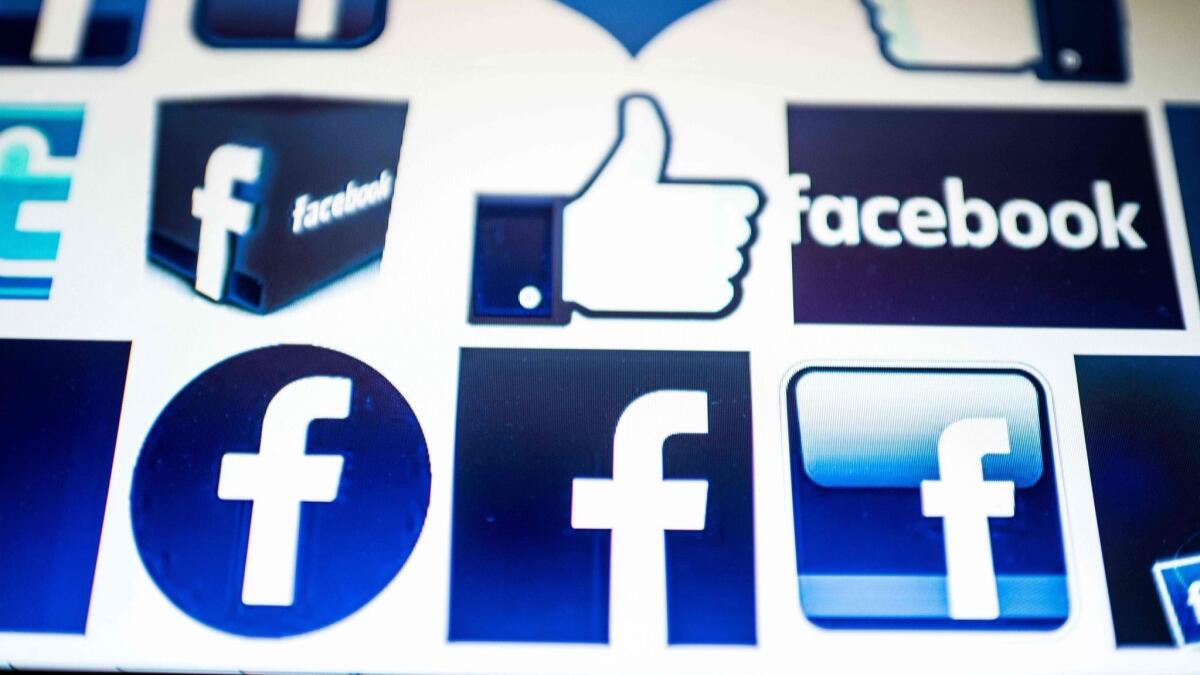Facebook’s data crackdown has two winners, and one of them is Facebook

- Share via
Facebook Inc. is putting tighter controls on data flowing through its giant social network in response to the worst privacy crisis in its history. Rather than hurt the company, this will ultimately give Facebook and its rival Google more power over a digital advertising market they already dominate, industry executives and analysts say.
The crackdown started last week after revelations a consulting firm that worked on Donald Trump’s presidential campaign improperly accessed information on millions of Facebook users. The first victims were data brokers like Acxiom Corp. and Oracle Corp.’s Data Cloud that sell information marketers use to target ads on the world’s largest social network. Facebook is scrapping the targeting tool and will stop sharing anonymous information the brokers use to measure ad performance.
The company said this “will help improve people’s privacy on Facebook.” The shares have slumped on concern tighter data policies like this will make Facebook ads less valuable, denting revenue growth. But some in the advertising industry think the changes will push marketers further into Facebook’s arms, sending more spending directly to the company.
Editorial: Facebook finally steps up on privacy. Now it’s Congress’ turn »
“The elimination of third parties is smart strategically,” Morgan Stanley analysts said this week. They expect no “material reduction” in spending on Facebook and, over time, the company will net more ad dollars by avoiding industry middlemen.
For years, advertisers grumbled about the “walled gardens” of internet giants — digital barriers Google and Facebook maintain to prevent outsiders from accessing user data while limiting their ability to independently measure and track ad effectiveness. Recently, the companies — which control 87% of digital advertising — have listened, granting more access. But this opening up could stop now.
“Facebook is raising the walls around its garden,” Morgan Stanley’s Brian Nowak wrote. “The two largest online ad platforms will now be more aligned, focusing on their first-party data offerings and tool sets, which we expect to enable Facebook and Google to continue to drive 90%+ of the online ad market.”
Others were less enthused. Acxiom shares slumped as much as 34% after Facebook’s abrupt decision Wednesday. “Facebook’s announcement amounts to an insidious head fake,” Axciom director John Battelle wrote in a blog post. “Facebook is planning to profit from a scandal of their own making.”
‘A few’ advertisers have stepped back from Facebook, Sheryl Sandberg says »
Some in the industry feel Acxiom and its peers are scapegoats in Facebook’s effort to win back goodwill after its privacy flub. “It’s called throwing them under the bus,” said Brian Wieser, an analyst at Pivotal Research Group.
Firms like Acxiom gather public information, such as census and mortgage data, and collect other information through consumer surveys and other methods. Starting in 2013, a Facebook program called Partner Categories let advertisers package that data with their own information to target specific consumer groups on Facebook. An automaker, for example, knows information about current customers but not future ones. Using Acxiom data, it could show ads on Facebook to people in a particular state, with a certain income, who are likely to be in the market for a new vehicle. Advertisers argue that these partnerships, which tap outside data to reach Facebook users, are different from the Cambridge Analytica episode, where internal Facebook data leaked out.
Facebook had another program that let advertisers overlay their own data with third-party firms’, called Managed Customer Audiences. Third-party access to that tool was cut last week, a Facebook spokeswoman said. Meanwhile, Facebook has invested more in its own targeting tools that use just the social network’s data, so an eventual move away from third-party brokers was expected. Still, the decision to cancel Partner Categories was a surprise.
By making it more cumbersome to use outside data sources, Facebook can exert more control in the ad-buying process and keep some insights about consumers hidden from marketers, said Michael Horn, a managing director at ad agency Huge. “They can claim privacy while moving advertisers more deeply into their own systems,” Horn said.
Facebook could still take a financial hit from the loss of ad targeting capabilities. Morgan Stanley lowered its revenue forecast for the company by 2%, citing steps to improve data safety. But if Facebook doesn’t benefit from its stumble, the other digital titan will.
With less data to target ads on Facebook, marketers will likely work more with Alphabet Inc.’s Google. Take the Acxiom example. Google announced a partnership with that firm in 2016 to improve Google’s search, display and video ads. Marketers upload their own data using Acxiom to reach users signed into Gmail and YouTube, but the tool doesn’t use Acxiom’s proprietary data to target Google ads. The deal remains in place.
“This whole Facebook debacle is very good for Google,” said Ari Paparo, a former Googler who runs ad tech firm Beeswax.
More to Read
Inside the business of entertainment
The Wide Shot brings you news, analysis and insights on everything from streaming wars to production — and what it all means for the future.
You may occasionally receive promotional content from the Los Angeles Times.










